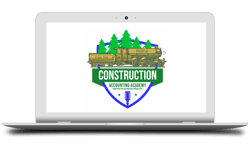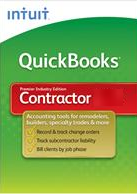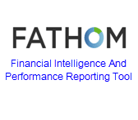This can lead to operating at a loss - spending more money than you make. Otherwise, you will eventually run out of cash reserves and be out of business. And while it's not uncommon, especially for new companies, it's still not ideal and shouldn't continue in the long term.

It's undoubtedly challenging, but you can weather the storm with the following tips.
1. Study your data
You first need to identify why you're operating at a loss. If you're still in the start-up phase, you might not need to worry too much as long as you've got enough cash to meet your costs. But if the losses are due to a decline in sales, then it's time to review your construction business and, if necessary, get professional help.
Your numbers are always helpful, but in times of rapid inflation, you'll be incredibly thankful that you keep a nice, clean set of books. Analyze your data to learn what products and services make you the most money, which ones cost the most to offer, and to identify where you can save.
2. Cut expenses
Now that you've identified where you can save money, go ahead and cut what you can. It's nice to be able to offer many products and services, but this is a time to tighten your belt.
Focus on the items that keep your business as healthy as possible, and ditch the rest – at least for the time being. It's okay to simplify, especially when times are tough.
3. Adjust your prices
Nobody likes to raise their prices, but you likely have no choice. Keeping fees the same would indeed be fantastic for your customers or clients. However, if you're offering your products or services at the same prices as before inflation started to climb rapidly, you're absorbing the cost.
When you dig into your data, you may find that some things you offer actually cost you a lot of money. That's not a sustainable business model – raise your prices to keep yourself afloat. You should always seek to raise your rates over time to improve your profit margins and keep up with inflation.
4. Simplify and automate
If aspects of your business take a long time to complete, see if there's anything you can do to reduce those hours. Switching to cloud accounting or inventory management software would be an excellent example, as doing so would allow you to use your valuable time elsewhere.
Identify where you can simplify and automate, and then do it. Then, even when inflation comes back under control, you will undoubtedly find that the saved time helps.
You can build efficient systems by streamlining your processes and using technology. There might be administrative tasks that you can ditch altogether.
5. Focus on your client
Remember that your clients are keeping you in business and experiencing inflation in their lives too – both at home and in their businesses.
Keep the lines of communication clear and open, especially if you're going to alter your offerings or raise your prices. It's easier to retain loyal customers than to gain new ones, so make sure they know how much you value them and communicate openly to maintain their trust and loyalty.
6. Consider your employees
Good help is hard to find. Those who work for you are feeling the pinch as well. While it's essential to automate what you can, you must consider the consequences it will have on your staff. Identify how you can better use their talents if parts of their roles become automated.
7. Remember, this will pass
Inflation has happened before and will undoubtedly happen again after this. Historically, periods of inflation last anywhere from a few months to several years. However, we remember one thing: all periods of inflation end.
Final thoughts
While inflation is problematic for small businesses, there are steps you can take to reduce its impact. You will leave this inflationary period intact with clear communication and intelligent adjustments. Focus on what you can control and face what you can't with confidence and creativity.
It's also important to review your practices honestly and carefully to pinpoint what you can improve in your construction business during this challenging period. Being proactive with your marketing, asking for an expert's help with your accounting, and putting a plan in place for production are necessary to operate and grow your company during this time.
About The Author:
![]() Sharie DeHart, QPA, is the co-founder of Business Consulting And Accounting in Lynnwood, Washington. She is the leading expert in managing outsourced construction bookkeeping and accounting services companies and cash management accounting for small construction companies across the USA. She encourages Contractors and Construction Company Owners to stay current on their tax obligations and offers insights on managing the remaining cash flow to operate and grow their construction company sales and profits so they can put more money in the bank. Call 1-800-361-1770 or sharie@fasteasyaccounting.com
Sharie DeHart, QPA, is the co-founder of Business Consulting And Accounting in Lynnwood, Washington. She is the leading expert in managing outsourced construction bookkeeping and accounting services companies and cash management accounting for small construction companies across the USA. She encourages Contractors and Construction Company Owners to stay current on their tax obligations and offers insights on managing the remaining cash flow to operate and grow their construction company sales and profits so they can put more money in the bank. Call 1-800-361-1770 or sharie@fasteasyaccounting.com
OUTSOURCED ACCOUNTING FOR
THE BUSY CONTRACTOR
IN A MOBILE ENVIRONMENT
 |
 |
 |
 |
Download the Contractors APP today from the App Store or Android Store
Access Code: FEAHEROS
Click here to download the App on Android:
Click here to download the App on iOS:
Simply scan the QR code or search for ‘MyAccountants’ in the App Store and enter the Access code: FEAHEROS to utilize the powerful App features and capabilities and benefit from having our Construction Accounting App at your fingertips, 24/7."
PS: Even if you are not a Construction Contractor, you will find plenty of benefits in the app, so we invite you to download it too! It's Free so why not?





























